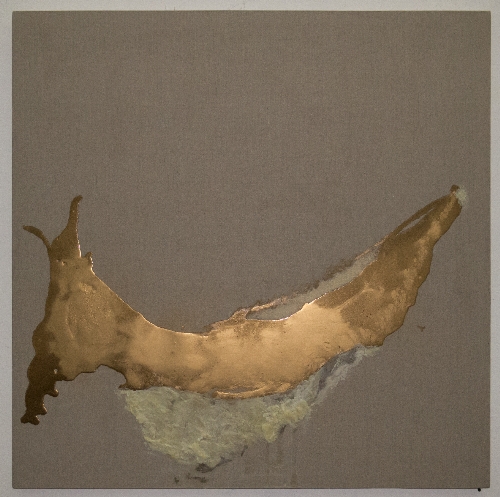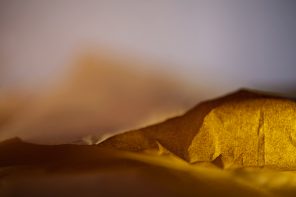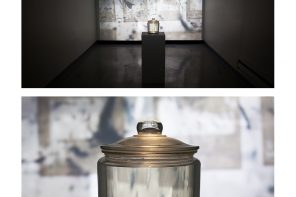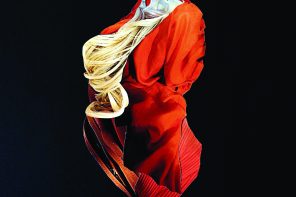How to Dismantle a Heart
My mother used to say the heart makes music, but I’ve never found the keys. Maybe it’s
the way I was brought into the world: dragged across a river in the night’s quiet
breathing, trampling through trash and tired runaways as if tearing a window’s curtains.
We were barred from entry but repeatedly returned, each time becoming a darker part of a
tunnel or a truck bed. The sky was so still the stars flickered like carbide lamps. We
told time through the landmarks of the dead like cataphiles—the warren of a little girl’s
murder, the wolf’s irrigation pipe. When you see enough unwinding, beating is replaced by
the safety of wings. This isn’t goodness. The voiceless are never neutral. Bones sway to
elegy. Ebony burrows into the earth as a refugee. I grew up, eventually, but the sun was
like a cliff with a false bottom: you’d drop and come out the top again. Enough carcasses
draped over the dry brush. Enough water towers empty as busted rattles. When you’re a
child, the heart has a stiff neck and demands to be played. Later, it limps. Before my
knees could begin to ache, I crawled to the levee looking for a broken string. Some
wayward zil. I stretched my heart over a manhole and drummed it with broken pliers. It
wouldn’t even quaver. It snapped back into a seed, dry and shriveled and impotent.
That Was Not the Neighborhood I Wanted
world’s greatest volcanoes. Or one proving Goldbach’s Conjecture. Marionettes didn’t beg
for cash. The horses were plentiful but they didn’t take riders, and what good is a horse
without a saddle? I told my legs to obey, to clop as well as they could to find the store
I wanted. It was there, even if made tiny by the adjacent savings & loan. It existed
even if the noise of the albums within it were drowned out by electric rickshaws. I asked
the owner where the city in the postcard had gone. He pointed to the clouds. The other
thing missing was a sense of direction. I gave him the record and he placed it
immediately on the player to confirm. What kind of monster would I be to falsify my own
mouth? But he wanted safety. Which tramples beauty. Shelf upon shelf of music but he only
trusted a handful of notes. Like most people, he didn’t believe his own body. Sure enough
when I returned outdoors, my money in hand, a rifle asked me for my papers. It had been
tipped off by almost everyone. You have nowhere to run, it said. This is when I
disappeared. I’m capable of nothing else but making an exit.
Epoché in the Southern Counties
of an American presidential candidate. Those demonstrators do not accept that California
is California. They think it’s part of Mexico.”1ω
you are neither the wave
the wave is not in you
the intimation of the wave
is not the wave
across the ocean
a boot descends
on a shore
and conveys the wave
it was possible
to prepare for the wave
having no sense of the wave
they failed
no idea of trample
no sense of cracked
saucers, the catastrophe
of mismatched furniture
the wave is the wave
the realization of the wave
is the wave
what is left: no wave
ω
When a wave undergoes reflection, it remains within the medium and merely reverses its
direction of travel.2
ω
The ocean appeared on a night with no headlights. The coast I knew since childhood
uprooted. The wave a pair of hands snatching cloth from a kitchen table. I was asleep
when it entered the bay, its morions glistening. Who had opened the door? Who had
forgotten to secure the window? Who had neglected to build a wall? My brother screamed
and I stuffed him and the instruments into a metal tub and scrambled. They turned us away
at the checkpoint to the other country. Have you ever tried passing for people who don’t
know anything more than what their fathers have said? We tried to explain and they lifted
their shirts to reveal pistols, whips, and various laws. We took the back way and
discovered an old man who offered to give us the only food he had, but it resembled the
terrible things we had seen in the wave, and we turned it away. In an abandoned park a lady
sat on a swing that complained like a bathing revolver. She mistook us for magicians. I
was afraid to show her how few miracles we possessed. It was a wandering country, a
stunted country. It was a country with an open maw but no words. We settled there. In a
green house on blocks so the wind could comb under its shirt. Far from the sea. Far from
the judgement of waters, or the kind of hands that knead dough until it disappears.
ω
The quake is fear, but the wave is greater. It is not possible to comprehend the wave. It
was possible to prepare, but there was no preparation. Under a mile of ice in the
Antarctic, a coast. Throats filled with blood in a previous parenthesis. Then the wave.
Twinning: the Pacific Coast, the great Gulf, the border wall. The error is believing the
whole life is contained in the body. Instead, the wave.
ω
If the body as wave is questioned, it dissolves. Doubt is inserted into the fissure
between aim and target. Here is a body and here is invasion. Here is still water and here
is the wave and catastrophe. An infant with a bastard name, like Joaquin. A waif who
sells rice paper mums on the street. Another who peddles painted eggs. The boy who washes
windshields. In his bucket of black water: the wave.
ω
“The rush to blame Mexico and Mexicans is not limited to migrants hired by U.S. employers
and drug cartels that supply U.S. markets. The spring of 2009 brought another wave of
worry about Mexican invasion—the H1N1 swine flu. Fortunately, the influenza proved more
debilitating than deadly. Mexicans in Mexico suffered most—in disease, death, and daily
restrictions. Still, U.S. media regaled a fearful public with visions of a deadly
‘Mexican’ invader poised to kill susceptible ‘Americans’ until it became likely that the
virus had jumped from hogs to humans in a Mexican community where a U.S.-owned industrial
slaughterhouse operated with few environmental and health safeguards. The focus on the
virus as another Mexican invader faded, giving way to a more constructive emphasis on
global health in a globalizing world.”3
ω
Next to the wave
the island
resting.
The true nature
of things:
the wave grasps
out for itself
and finds nothing.
In the crook
of the elbow:
an inconvenience.
ω
What to do about the wave
caroming across the river
in its bare feet?
The solution is complicated.
Therefore, the wave drowns.
The wave dies of thirst in the desert.
The wave is sold into slavery.
A wall is erected hoping to kill
the wave directly at its trough,
although necessity is the kind of wave
that cannot be killed.
Unless the anvil. Unless the pick.
Unless force were met with force
by the collar, this argument
is very old. Essence: you and I
are two contrary objects.
An ethical system can only be valid
for members of the same set.
Essence: solipsism is identical
to the maelstrom
from which the wave cannot escape.
1. Stuart Varney
2. www.physicsclassroom.com
3. Mexico and Mexicans in the Making of the United States. ed. John Tutino (University of Texas Press, 2012), 2
Rodney Gomez is a member of the Macondo Writers’ Workshop. His collection Citizens of the Mausoleum is forthcoming from Sundress Publications. His poetry has appeared or is forthcoming in Poetry, Rattle, Blackbird, Pleiades, Denver Quarterly, and Puerto del Sol. His honors include the Drinking Gourd Chapbook Prize, the RHINO Editors’ Prize, and the Gloria Anzaldúa Poetry Prize.




